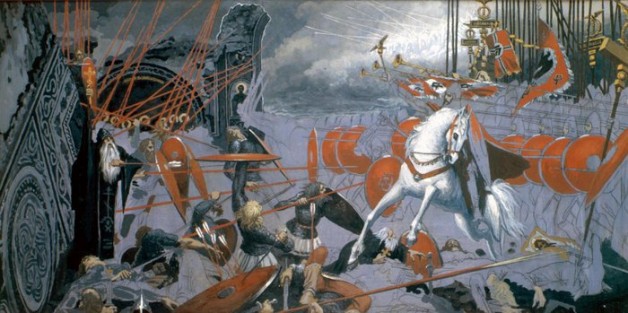Our monks go robed in rain and snow,
But the heart of flame therein,
But you go clothed in feasts and flames,
When all is ice within
So sings Alfred, King of Wessex, to Guthrum of the Northern Sea on the eve of the Battle of Ethandune in G.K. Chesterton’s Ballad of the White Horse. This is Chesterton’s famous retelling of the struggle between Anglo-Saxon Christians and Viking pagans early in English history. In the background of the Ballad, the Vikings have defeated Alfred’s army, taken large swaths of English territory, and are now feasting and enjoying themselves before continuing their conquest. Having entered the Viking camp as an anonymous harpist, King Alfred now sings his defiant song to the Viking warrior.
Alfred responds in verse to a question perennially put to Christians: why live in such a seemingly limited way? Why not possess more? The exemplary Christian seems altogether indifferent to possessions, scorning power, prestige, and influence as well. On strictly material grounds, Christianity is now, and has always been, quite the losing proposition. As Chesterton’s Viking King asserts, Christianity makes you weak:
Doubtless your sires were sword-swingers
When they waded fresh from foam,
Before they were turned to women
By the god of the nails from Rome
The objection to Christianity raised by Guthrum echoes throughout modernity. The challenge is no longer articulated in Old Norse, but rather in English, French, and German. It is no invader from the sea coming to conquer Christian lands. Rather it is a question arising from within our own culture.
For a few weeks now, the Church has given us Mass readings from the Letter to the Hebrews, an inspired letter which takes up this very question. Speaking of believers in the course of salvation history, the author states,
Others endured mockery, scourging, even chains and imprisonment. They were stoned, sawed in two, put to death at sword’s point; they went about in skins of sheep or goats, needy, afflicted, tormented. The world was not worthy of them. They wandered about in deserts and on mountains, in caves and in crevices of the earth. (Heb 11:36–38)
Yet why did these people live like this? The answer lies not in the difficulties themselves, but in the reason for their endurance—their adherence to their God. It is only at the end of a difficult hike or a grueling rugby match that a man realizes all that he has accomplished. In the same way, holiness is often unwittingly forged amidst the trials of life. The saint is so preoccupied with God, and so little preoccupied with self, that by the time he gets to heaven, he finds that his sins and imperfections have been ground away by the difficulties of the journey. By voluntary poverty or simplicity of life, the Christian travels light, setting his sight on the end of his journey.
But is such a life livable? Is there hope for victory at the end of a life lived in this way? The Letter to the Hebrews and Chesterton’s ballad both agree on this point. Both give a clear, resounding “Yes”.
I have not time to tell of Gideon, Barak, Samson, Jephthah, of David, and Samuel and the prophets, who by faith conquered kingdoms, did what was righteous, obtained the promises; they closed the mouths of lions, put out raging fires, escaped the devouring sword, became strong in battle, and turned back foreign invaders. (Heb 11:32–34)
Despite being outnumbered, King Alfred won the victory against the Danish invaders. Though it appears weak, Christianity has a durability that has confounded all of its opponents throughout its long history. At the end of his life, “The God of the nails from Rome” was clothed only with the elements. Though we too may be “robed in rain and snow,” He is the flame that lies within.
✠
Image: Konstantin Vasilyev, Invasion







